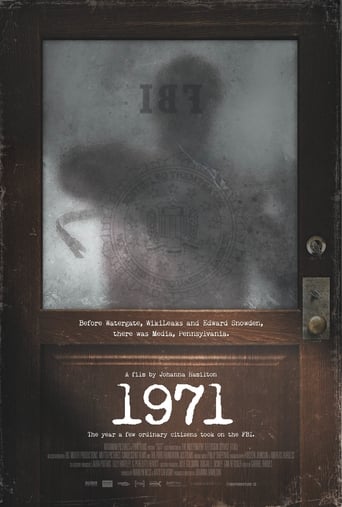

The greatest movie ever made..!
... View MoreSurprisingly incoherent and boring
... View MoreThe film may be flawed, but its message is not.
... View MoreThe film's masterful storytelling did its job. The message was clear. No need to overdo.
... View MoreHaving lived through this period, and remembering a lot of it well, the film was something of a nostalgia trip for me, and a terrific companion piece to Betty Medsger's excellent book. (Wish we'd seen more of her.)But why oh WHY do documentary filmmakers feel it necessary to use reconstructions with actors, as here? They are not only distracting (and perhaps confusing - ?), they suggest that the director does not trust her witnesses, who are FAR more interesting to watch and listen to than the dully animated wallpaper of the reconstructions.For a purist like me, such tricks make me distrust the veracity of the material, but then I'm an old school documentarian, and growing more curmudgeonly with the passing of the years.p.
... View MoreThe story told in "1971" is a very important one for every American and I do recommend you see it. However, despite this I have to be honest...I had a very hard time staying awake during the film. Normally I don't have this trouble but think it wasn't just me...the film, despite about some important events, comes off as very slow. See it...just try to have some caffeine with you.The story in this film is super-important. At the height of the anti-Vietnam War movement, an unknown group of dissidents broke into a local FBI field office in Pennsylvania and stole the documents in the office. This was important for two reasons: the documents held important evidence of illegal FBI activities and copies of the documents were sent to the press! Now, for the first time, concrete evidence was known to exist that talks about FBI harassment of innocent Americans the agency saw as subversives! So, breaking up marriages and manipulating innocent people was fair game for the agency--mostly because there was practically no oversight of the FBI.So why is this important today? Well, with increasing surveillance by not only the FBI but Homeland Security, we once again have the POTENTIAL for abuses of civil liberties. Additionally, with the WIKILEAKS and Edward Snowden stories in the news, the events of 1971 seem very familiar once again. Overall, an interesting story told in a rather dry and low energy fashion that every American, on the right, left or in the middle, should see.
... View MoreAn amazing story that many of us from that era have little exposure to...There was so much going on, this one slipped under the rug...What these young people did in 71 was expose, for the first time, the seedy underbelly of the security apparatchik-publicly...If you enjoy true exposes, especially when it comes to government malfeasance, this is a great and interesting glance at the tip of the iceberg...Hopefully, it leads to a greater understanding of what we are truly up against as a society...The paranoia of the system is astounding to behold...We need to continue our vigilance and this movie should give you the courage to do something...Anything...We owe it to our progeny.
... View MoreHaving marched for peace in the late 60's and early 70's I was thrilled by this film!Smart, committed people penetrated the impenetrable fortress! I hope they inspire others to uphold true American ideals and non violently oppose abuses of power.These people are heroic American patriots and their story is a vital part of our history.This film moved me in a deep way. I'll never forget it. I'm grateful to the film makers and especially to the brave people who skillfully undertook this action and generously came forward to tell their tale all these years later!
... View More